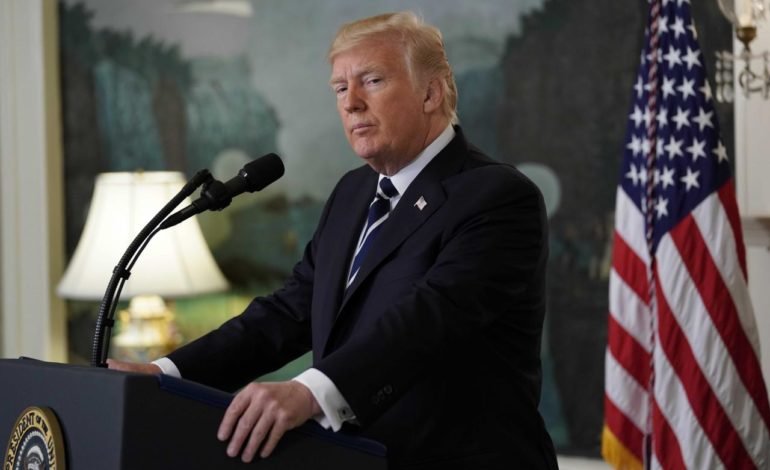U.S. withdrawal from nuclear deal: Unsettling implications

The U.S. withdrawal from the 2015 Iran nuclear deal between Iran and the leading world powers, which has lifted sanctions in exchange for verifiable limits on Iran’s nuclear program, has created a whole host of problems, not just for Iran but for the European Union (EU) member states.
It is generally believed that without a core participant and guarantor—that is, the United States— the nuclear deal may not be upheld much longer.
Perhaps the broader question is: Will this division between the United States and its European allies, who intend to preserve the deal, weaken or strengthen U.S. leadership position on the global scene? A growing, if not widespread, perception in Europe is that the so-called “indispensable” United States has increasingly become the “unpredictable” United States. This element of unpredictability is likely to cause further friction rather than unity between the United States and its longstanding Western allies.
What is still to come is not clear. It appears, however, that the Europeans are caught in the moment of utter confusion regarding the cost of sticking to the deal, as the prospect of reaching a consensus with the United States seems highly unlikely for now at least. The enforcement mechanisms is likely to create a tremendous burden on the U.S. European allies.
Jean Claude Juncker, President of the European Commission (The New York Times, May 18, 2018:A10), has said that the Commission has a “duty to protect European companies” from U.S. sanctions, invoking the so-called 1996 statue to block such sanctions in an attempt to salvage the nuclear deal. Nevertheless, larger firms and multinational companies have begun to retract their commercial and military agreements with Iran. Bijan Zangeneh, Iran’s oil minister, has announced that Chinese state-owned oil company CNPC was ready to replace Total if the latter decided to withdraw (https://www.aljazeera.com/news/2018/05/eu-moves-block-sanctions-iran-180517134848253.html).
For the Europeans, the lingering question is: Should EU countries push back against the Trump administration over the Iran nuclear deal? French Finance Minister Bruno Le Maire has reportedly noted that Europe should maintain its economic sovereignty by challenging the U.S. role as the “world’s economic policeman.” This is understandable, given that the French energy giant Total has a $5billion deal to extract Iranian natural gas. The deepening French economic ties with Iran have also included Airbus, which has already begun delivering jets to Iran Air under a multibillion-dollar contract.
Germany has similarly found itself in an awkward position, hoping to keep its foreign investment in Iran steady while at the same time not jeopardizing its economic ties with the United States. Volkswagen, the German automaker, has continued exporting cars to Iran. Richard Grenell, the U.S. ambassador to Berlin, according to the European newspapers, has warned Berlin against the continuing normal trade ties with Iran: “German companies doing business in Iran should wind down operations immediately.”
The Trump administration has returned to the decades-old familiar strategy toward Iran, one which was based on sanctions and coercive diplomacy rather than negotiation and reliance on agreements. Today, Trump’s aids believe that the same strategy could force Iran to change its foreign policy behavior. John Bolton, Trump’s national security adviser, has sent an utterly ominous signal to those European countries doing business with Iran, appearing convinced that the Europeans will find it in their interests to follow the U.S. lead rather than resuming with the nuclear deal. Europeans are torn between having lucrative contracts with Iran on the one hand and maintaining normal trade ties with the United States on the other.
The extra-territorial impact of sanctions has raised serious concerns about penalizing foreign businesses that trade with or invest in Iran. The U.S. sanctions on Iran not only block American firms from doing business in the former, but also prohibit foreign firms that do business there from accessing the larger U.S. banking and financial system. Renewing sanctions would make it immensely difficult for Iran to sell its oil abroad or use the international banking system.
Iran produces roughly 4 million barrels per day of crude oil, accounting for about 4 percent of global supply, much of which is exported to Asia, including China, India, Japan and South Korea. Tehran will look further to the east, where China and Russia will become its major trading partners as a result. Most notably, China’s trade ties with Iran could come into conflict with—if not countervail—U.S. sanctions. While it is true the volume of trade between China and the United States far outweighs that of Iran and China, Iran nevertheless continues to occupy a pivotal place in China’s reinvigoration of the historical Silk Road. With the threat of sanctions looming large, Iran will most likely seek new opportunities under China’s “One Belt, One Road” initiative in the coming years and decades. The regional and international implications of this policy cannot be underestimated.
On balance, the occurrence of a U.S. policy that pushes states to choose between banking in U.S. dollars and with U.S. firms operating under a different financial system could not come at a worse time. The U.S. has engaged in an increasingly fruitless trade war with the Chinese, has come under heavy criticism from Europeans allies for its trade policies, and has created tension with enemies and allies alike in the international system. Whether this pushes states to reconsider the already diminished stature of the United States in the world system remains to be seen, but clearly the writing is on the wall: international relations are now operating in a potential post-American world and the rebalancing as well as recalibrating of financial interests may be forthcoming.
Mahmood Monshipouri teaches international relations and Middle Eastern Politics at San Francisco State University and the University of California, Berkeley.
Leave a Comment